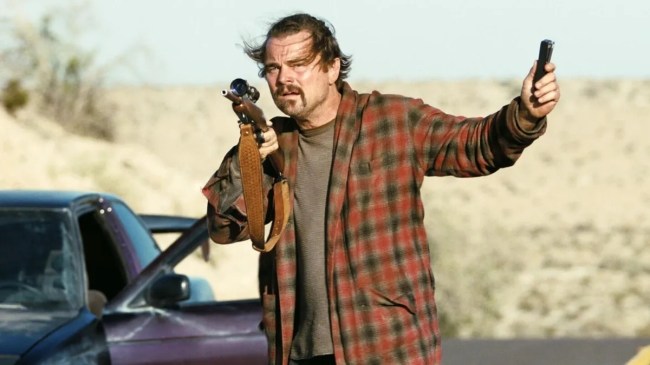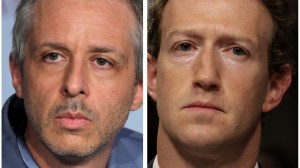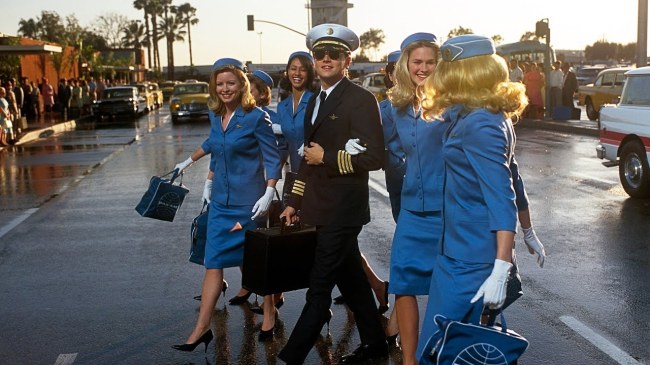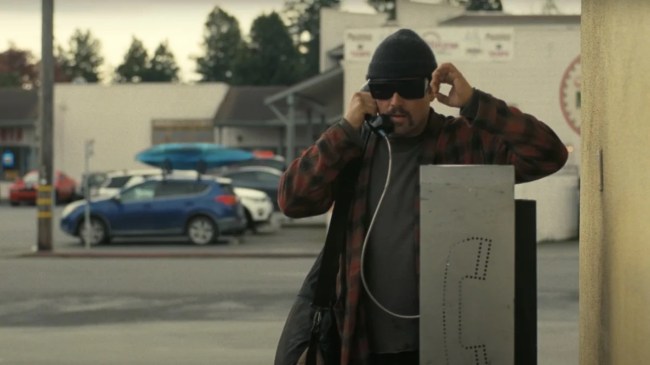Why One Battle After Another Is Leonardo DiCaprio’s Best Performance





The following essay was written for the new edition of “In Review by David Ehrlich,” a biweekly newsletter in which our Chief Film Critic and Head Reviews Editor rounds up the site’s latest reviews and muses about current events in the movie world. Subscribe here to receive the newsletter in your inbox every other Friday.
A movie star in an age without movie stars, Leonardo DiCaprio has always felt like something of an anachronism. Strange as that might be to say about an actor whose angel-kissed image once felt as endemic to the late ’90s as mom jeans and the Macarena, his defining roles — even from the beginning — were predicated upon creating a palpable disconnect between the past and the present. In stark contrast to a (somewhat older) contemporary like George Clooney, whose “man out of time” appeal was rooted in smoothly transposing Clark Gable’s image onto a late 20th century landscape, DiCaprio’s celebrity hinged on stressing the distance between then and now.
“Romeo + Juliet” seized on the sheer modernity of DiCaprio’s affect — the fact that he unmistakably had the face of someone who had seen the inside of a mall — to relocate Shakespeare’s most romantic tragedy from Elizabethan Verona to “Baywatch”-era Venice Beach, while “Titanic” cast him as an undead memory whose “Teen Beat” appeal was anchored to his character’s turn-of-the-century pluck. Steven Spielberg seized on the actor’s dreamy atemporality with “Catch Me If You Can,” in which DiCaprio effectively played a boy and a man at the same time (a balancing act crucial to that movie’s timeless charm and exquisite tenderness), and Martin Scorsese eventually figured out how to retain the essence of DiCaprio’s screen persona as the heartthrob matured into his 30s and 40s.
The wayward span between 2004 and 2010 yielded the least memorable work of DiCaprio’s career, but everything began snapping back into place with “Shutter Island,” which saw him play a “duly appointed federal marshal” so psychically removed from his own past that the actor’s signature inscrutability — what his detractors might describe as a mannequin-like hollowness — was repurposed as an elaborate defense mechanism. After so many roles that required him to straddle between different temporalities, DiCaprio was cast in the role of someone whose entire reality hinges upon keeping them separate.
In assigning him that seemingly perverse task, Scorsese tapped into the vague air of vacuity at the center of a star who’s always seemed present and absent all at once. An actor who’s simultaneously “here” and “elsewhere,” forever stuck in time even as he keeps getting older before our eyes (a condition that applies to his ability to stay relevant even though he takes years between projects, his ability to remain a huge box office draw without opening himself up to press, and of course his ability to keep dating 25-year-old models who weren’t even born when the “Pussy Posse” was first on the prowl).
Whether you call him Edward Daniels or Andrew Laeddis, DiCaprio’s character isn’t balancing between past and present so much as he’s stuck in one and projecting himself forward into the other — the chasm between the two grows wider every day, and he’s doing whatever he can to fill it with anything he can to ease the pain of that empty space. Scorsese identified that space as the perfect cavity to hide all manner of sins (a cavity he would find even more rewarding use for in his subsequent collaborations with DiCaprio), and from that point on it’s been clear that no other leading man of his generation is capable of making their emptiness feel quite so full. He’s the man who’s almost there.
“Shutter Island” perfectly teed DiCaprio up for a string of indelible roles that made the most of his ability to be unmoored from his own image. In “Inception,” he was another lucid dreamer with a dead wife — as desperate to return to reality as he was eager to avoid it. In “The Great Gatsby,” he epitomized the desolation of the American Dream with a performance that embodied the notion of being “within and without” oneself at the same time (as Nick Carraway would describe his own experience at the periphery of Gatsby’s life), and in “The Wolf of Wall Street” — he swan-dove into the bottomless pit of Jordan Belfort’s soul as if it were Scrooge McDuck’s bank vault.
That last part found DiCaprio in more explicit conversation with the emptiness he projects on screen, and weaponized it to newly hilarious effect. DiCaprio had never been considered as much of a comic actor, but there he was at the center of Scorsese’s funniest movie, the humor of which stemmed from shining a light into the void-like cavern where his character’s soul should’ve been and marveling at just how deep it went. Even on the cusp of 40, DiCaprio was still able to play Belfort as a kind of perpetual boy-man who exists in between opposing polarities: between wide-eyed kid and veteran Ponzi schemer, between crime and consequence, between the “greed is good” heyday of the film’s setting and the “no it’s not” reality of the climate that greeted its release (which arrived on the heels of the Great Recession).

Once again, DiCaprio’s interstitial quality was more of a feature than a bug, and it’s no wonder that Quentin Tarantino looked to him when casting the role of a fading TV star who was stuck between the afterimage of his former glory and the torturous proximity of Hollywood stardom. It’s just as unsurprising that DiCaprio’s Oscar-winning turn as the beaten and bruised lead of “The Revenant” — a role that fought against his “unfilled” screen image as an actor by tearing his guts out rather than allowing him to appear unfilled — ranks among his least memorable performances.
On some level, I have to imagine that DiCaprio recognizes his own strengths. His decision to play the oafish and vile Ernest Burkhart (rather than the more heroic BOI agent Thomas Bruce White Sr.) might have been motivated by a desire to steer “Killers of the Flower Moon” away from a white savior narrative, but it also provided the actor with an extraordinary chance to inhabit a self-disassociating man who no longer understands the full truth of his feelings, let alone his actions. At last, here was a chance not just to create an emptiness, but to get lost in it as well; to play someone so inculcated in the historical violence of white hegemony that he seems plausibly semi-oblivious to the fact that he’s poisoning his own Indigenous wife. “Can’t repeat the past?,” Jay Gatsby once exclaimed. “Why of course you can.” And DiCaprio has made a brilliant career of playing characters who try to do just that, and often wind up embodying the futility of that ethos.
The genius of his casting in Paul Thomas Anderson’s “One Battle After Another,” and why his performance as revolutionary-turned-hermit-girldad Bob Ferguson feels like the natural culmination of his screen work so far, is that it finds DiCaprio playing a character whose past is constantly bringing itself to bear on the present — looping in his mind like “The Battle of Algiers” broadcast he watches on TV for comfort — whether he likes it or not. And he definitely does not like it.
Indeed, Bob, aka the demolition expert formerly known as Ghetto Pat, has spent the last 16 years lying low/smoking himself into oblivion in the woodsy Californian enclave of Baktan Cross because he’s so petrified at the thought that the government might root him out one day, and separate him from the teenage daughter he took home from his revolutionary years like a bittersweet souvenir (Chase Infiniti plays Willa). Like most parents, he’s grown terrified of the world that he once lived to defy. Unlike most parents, Bob’s terror has grown so pronounced that it’s forced him to isolate from the world altogether.
A typical DiCaprio movie would focus on the details of that dislocation; it would map the distance between Bob and Willa, articulate the generational divide that’s come between them, and otherwise exploit DiCaprio’s peerless aura of partial absence. “One Battle After Another” fights against that impulse. It gives Bob and Willa exactly one scene to establish their shared dynamic, and then just a few minutes later makes good on Bob’s worst nightmare twice over: Not only is Willa being pursued by the same Army freak who had a major hard-on for her mother (a hard-on that we get to witness firsthand), but the jackboots are coming after Bob as well, flushing him — bleary-eyed and bathrobed — out of his rabbit den and back into the light of day, where he Forrest Gumps his way through everything from a glorified ICE raid to a “Vanishing Point”-inspired car chase in pursuit of the daughter he’s powerless to save.

Suddenly, a DiCaprio character finds himself trying to catch up with the present rather than pull everything around him back into the past (as opposed to a guy like Rick Dalton, who sort of lucked his way into a Hollywood ending). From the moment Bob emerges from his warren and gets wrapped up in a local sweep of undocumented workers (a sweep that Col. Steven J. Lockjaw is using as a pretext to flush him out), DiCaprio begins chipping away at the same barrier he spent the last 16 years building around himself. It’s profoundly, consistently, and endearingly funny to watch him try to make sense of everything at 100mph, as Bob races to reconcile the reality at hand with the past that his actions have brought to bear on the people of Baktan Cross. As I wrote in my review: “Bob is both at the center of the action and incidental to it all at once, like a peeling strip of wallpaper that blends perfectly into the background whenever it isn’t coming unglued,” but even when he’s pushed to the periphery of the frame you can still feel every detail of DiCaprio’s being — brow furrowed, jaw clenched, angry at the world but alive within himself until he gradually begins to balance that equation — in an active negotiation between the explosive revolutionary who Bob used to be and the tetchy coward that fatherhood has left behind.
The film’s abundant humor and humanity are both rooted in DiCaprio’s ability to contain both of those people at once — to span the distance between those opposite shores while flailing towards each of them with equal desperation. DiCaprio has never been afraid of being a total buffoon on camera (the lack of vanity he developed in the wake of his stardom has served him well and often), but he’s also never been more impotent or pathetic than he is during the battle of Baktan Cross, where he stumbles through the local karate sensei’s carefully laid extraction plan with a chaotic propulsion that feels closer to Chris Farley than Jack Dawson.
Whether pleading at a fellow revolutionary over the phone, sniveling at a secretly allied government worker, or trying his best to absorb a last-minute pep talk about putting his fear to the side (“Tom fucking Cruise!”), Bob is at the absolute mercy of everyone he meets. In being so petrified by his past, Bob has rendered himself useless to the present, and because DiCaprio so thoroughly owns that uselessness, he’s able to confront the incomparable heartbreak of realizing that he can’t protect Willa from the same dangers that he barely managed to survive himself.
The result is the most vulnerable and unguarded performance of DiCaprio’s career, as the empty space that DiCaprio’s characters have always lived inside — and the slightly hollow quality that he’s brought to so many of his roles since he was a teenager — is finally recast as something to be escaped rather than bridged, mapped, or gawked at. And by the time Bob finally reaches the border of that emptiness, the actor playing him no longer feels the least bit absent from himself. He’s not a vessel or a concept, not a dream or a memory, not a money monster or a movie star. He’s just a guy who’s fully there for the first time in decades.
If Bob doesn’t accomplish a single fucking thing to help save his daughter from Lockjaw, that’s because his character’s journey is all about realizing that he doesn’t have to. He’s not a member of the French 75 anymore, and Willa is no longer the baby she was when they went into hiding. His trajectory over the last two acts of this movie isn’t from burnout to hero, it’s from the failure of abandoning one revolution to the success of raising another. It’s from then to now. DiCaprio himself is still as inscrutable as ever, and no amount of begrudging podcast appearances is going to change that (how can a guy so invested in the health of our planet also invest in a country that continues to bomb it with impunity?), but after 30 years of being modern cinema’s most effective anachronism, he’s finally become a man of his time.
Want to stay up to date on IndieWire’s film reviews and critical thoughts? Subscribe here to our newly launched newsletter, In Review by David Ehrlich, in which our Chief Film Critic and Head Reviews Editor rounds up the best new reviews and streaming picks along with some exclusive musings — all only available to subscribers.
